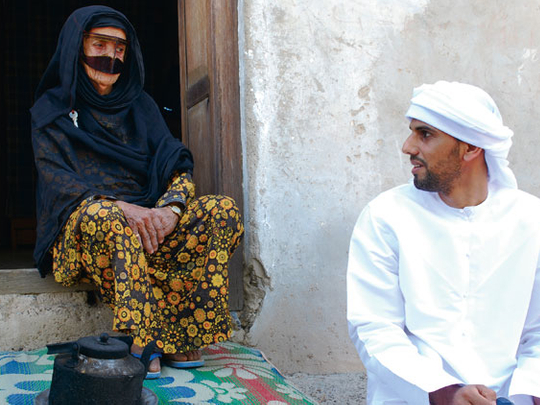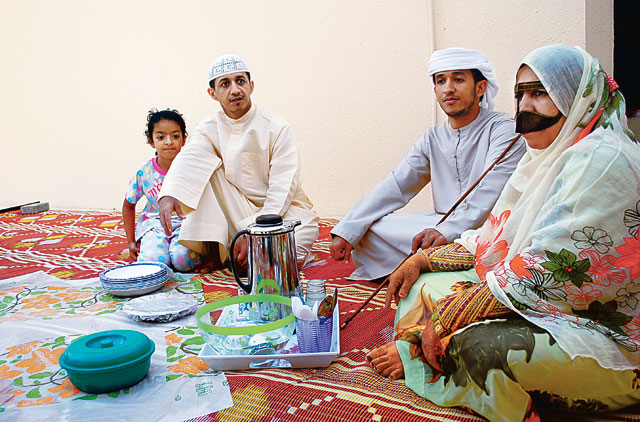
The stone house in the mountains is a stark contrast to the village dotted with modern villas. The white graffiti on a wall says Amna in Arabic and Suzuki in English.
Last year, I had gone to stay with my Emirati friend Amna, who is from the Asmah village in Fujairah. Her family has always welcomed me with open arms on my sporadic visits — making it an extended home in the UAE. The trip has always involved a leisurely drive through the village and mountains — to their farms and other areas. Till then, I had not seen this stone home — just farms full of lettuce, parsley, papayas, roses and many other fruits and vegetables (sometimes oranges). When asked if it was abandoned, I was told that this was the home of a relative, Amna Khamis Ahmed Alshehyari, an 88-year-old woman who chooses to live here during the daytime. Despite her children’s numerous pleas and requests, she will agree to stay in their modern homes only for the night. At my request, her favourite grandson, Khamis Mohammed Saeed Almazrooei, arranges a meeting with her. My friend Amna’s brother, Salem Abdulla Ahmed Ali Alshehyari, will take us to the mountains after lunch. The elderly Amna is waiting for us at the entrance to the home. When I greet her in Arabic, she unexpectedly shakes my hand with a firm grip. It augurs well for the rest of the afternoon. While she warns us about the steep levels in and around her house, she nimbly manoeuvres around in flip-flops.
The daily routine
The house is about a hundred years old. It started as a small structure and has expanded into a series of rooms on different levels. “I arrive here early morning and stay till lunch. Then I go to my son’s home and return to stay till sunset. Everyday,” she says. Why? “I miss my father, my mother, my brothers and my family. This place is full of their memories,” she says. Her eyes mist over as she rolls out their names and emphatically hits one open palm on another. Khamis, who works with the UAE Armed Forces, lives in Abu Dhabi and comes home on the weekends. He shares an easy camaraderie with her — the kind that grandchildren enjoy.
“This is my home. Besides, I don’t like air conditioners — they cause illnesses,” she confides. Her sprightly health is proof of that statement. Outside, her herd of goats heed her every call. “She knows every beast from the 100 odd goats and sheep. She says that a person will know who or what really belongs to them — even it is an animal. She once lost a goat. Days later, she came across another herd. Suddenly, this one goat started bleating out to her. She recognised the animal, went right into the herd and picked up her goat. This is a true story,” claims Khamis.
I ask if she gets scared being alone in such an isolated place. She grins and says that she knows how to shoot with an airgun. She had taken part in the tribal wars a long time ago in the mountains, explains Khamis. “There were four strategic watch towers in the mountains. She used to carry the food up to the towers. Along with guns and bullets (made by my grandfather). She also learnt how to shoot.”
She talks about the hard times. “One year, there were no rains and we ate leaves. Else, we grew all our food — potatoes, green pepper, tomatoes and so on. We used to barter in the old days — my husband took the farm produce to Fujairah and Ras Al Khaimah and exchanged vegetables for fish. We used to travel by donkey. Now it is very easy,” she laughs. “I find it difficult to live with others. The only time I leave the village is to go to a hospital but never for sightseeing.”
Once she was taken to Thailand for medical treatment. “The first day, she stormed out of the hotel and stood on the road. She then requested us to take her back in a taxi to the UAE. She did not like the strangeness of the place,” laughs Khamis. “Though she has gone to Saudi Arabia for Haj.”
She used to cook for up to 40 people on a daily basis in her youth, he translates. “She cooks even today but does not like food from cans. She eats very little. Her favourite food is white rice, yoghurt and dried fish for lunch while dinner is bread with honey or cheese or egg,” says Khamis.
Around the mid-seventies, the village got its first road. “Then people started to shift further and further away and life started to change. My grandmother was against my aunt going to school. She is dead against education and is not aware of UAE’s National Day. All she knows is [the late] Shaikh Zayed [Bin Sultan Al Nahyan]. She also gets angry if she sees that men and women meet each other before marriage,” he adds. He quickly stokes the flames over an old, blackened hearth to heat her favourite kettle and suddenly confesses to being the graffiti artist responsible for the wall. “I did that when I was a kid. It has her name, my initials and the name of my first car, which was a Suzuki. Now I drive a BMW and Nissan Patrol but I still have the old car,” he grins.
“I remember it used to rain throughout the year, when I was a child. After the mid-80s, the rains got scantier.” As we leave, Amna shakes my hand again. I see a key dangling on a red thread on the right side of her abaya. “It is a woman thing — the key to her room in my uncle’s home,” explains Khamis. It is time to gather the goats and she calls out to them. The herd comes rushing in. Salem tells me that I have witnessed nothing short of a miracle — that it is a rarity to get her in a happy mood or even have a conversation.
A different viewpoint
We go back to his home to talk to his mother, Sheikha Salem Ali Alshehyari, who has a different viewpoint. “I got married at 16 and had three of my children in the mountains. In 1980, we came down from the mountains to our present home,” says Sheikha. “Life was simpler then. If someone had a problem, everyone came to help them. Issues were solved jointly by the family.” She adds that cloth was coloured with vegetable dyes and everything was from their farm.
“My grandfather and father used to travel to different countries and trade in clothes and gold,” says Salem. He works with Abu Dhabi Police and comes home on weekends. He speaks of how there is still a unity among the young men of the village and how they pool money together for any wedding and help each others families.
His brother, Rashed Abdulla Ahmed Ali Alshehyari adds that their current home had just two rooms. Over a period of time, it became a cluster of four villas. “Earlier, we took half a day to reach Masafi, one and a half days to reach Sharjah and three days to go to Dubai. Women visited other emirates only when they had medical issues,” says Rashed. He says that though his mother did not know how to read or write, she was happy to get her sons and daughters educated. “I used to go by a pickup to school. It was very difficult but I really wanted to study and used to top the class,” he says. “I feel that my education has helped me grow and advance in my career.”
He has worked in the UAE Armed Forces, Etisalat and is currently in a senior position with the National Crisis Emergency Management. “I am still studying and upgrading my skills on a yearly basis. Also, though my mother did not study, we have also given her small classes and taught her numbers and alphabets. No one really guided me then but I really wanted to change my life and did,” says Rashid. Salem adds that it was Rashid’s vision and determination that has helped all the other siblings in the family.













